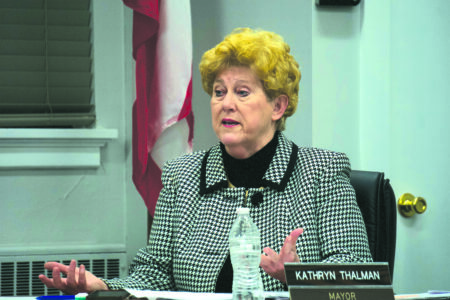Science journalist presents research into Austin Master facility
WHEELING — Science journalist and author Justin Nobel detailed his investigations into the improper hazardous waste storing and disposal practices at the Austin Master Services facility in Martins Ferry during the Wheeling stop on his “Petroleum-238” book tour.
Nobel’s account of the oil and gas industry avoiding environmental regulations in “Petroleum-238” covers not only the Austin Master facility, but also traces how improper practices at oil and gas facilities have hurt employees and communities across the country.
The Wednesday night presentation at the Ohio County Library came on the heels of Ohio Attorney General Dave Yost filing a temporary restraining order in March 2024 regarding improper waste storage at the Austin Master Services facility in Martins Ferry.
The 600-ton waste storage limit was exceeded at the oil and gas waste facility, as more than 10,000 tons of waste was allegedly collected at Austin Master. Yost described this as an “egregious violation.”
The Ohio Department of Natural Resources has suspended operations at the facility, requiring Austin Master to cease accepting waste.
The court-ordered deadline of April 17 for disposing of and cleaning at the facility was not met.
“Austin Master being shut down doesn’t mean this problem goes away, it just means that sludge [from the facility] is going to be elsewhere in this area,” explained Nobel during his presentation. “There are still radioactive metals in the waste at the facility that need to be dealt with.”
In “Petroleum-238,” Austin Master employee David Duvall recounts the unsafe workplace practices he witnessed at the facility. Duvall recalled being given flimsy protective clothing at the facility along with employees often eating, drinking and smoking while dealing with hazardous materials at the facility with their bare hands. Duvall was now experiencing tooth decay with some of his teeth falling out.
“They [Austin Master Services employees] were not informed that they were handling radioactive materials and were not protected against them,” said Nobel. “Often it is not that complicated to provide them protection, even simple things like respirators and knowing when not to eat or smoke cigarettes in the workplace. The oil and gas industry relies on ignorance of the knowledge of the harms of oilfield and fracking waste.”
Following Nobel’s retelling of Duvall’s experience at the facility, former U.S. Department of Energy Scientist Dr. Yuri Gorby tested the work boots of a former Austin Master employee for the decay of radioactive materials using a survey meter. As the sensor approached the boots, the survey meter beeped, indicating that the remaining radioactive decay on the boots was giving off a radiation signal.
Gorby explained that though the sensor was going off near the boots, they were still at a “relatively low” radiation level. He noted that the public health risk of radioactive materials at the Austin Master facility stems from inhaling or ingesting the particles from the facility.
In the case of radioactive particles at the Austin Master facility, Gorby explained that the two largest public health risks for Martins Ferry residents are inhaling the particulates while driving or walking along the road to the facility and ingesting radiological materials from the facility that have entered into municipal water systems.
“Inhaling those low levels (of radiation) materials is damaging because these are alpha and beta emitting particles that can damage our bodies, especially internally to lung tissue,” added Gorby.
For Nobel, spotlighting the unsafe practices at Austin Master and other oil and gas facilities is needed to ensure the public is “keeping track of these facilities and spreading the word to watch out for them.”
“Residents need to listen to the local environmental groups, as these people are doing the job of the regulators, they’re paying attention,” added Nobel. “They are trying to keep track of these facilities, and they’re spreading the word to watch out for them.”
Concerned Ohio River Residents was the local environmental group organizing Nobel’s stop in Wheeling on his book tour. Member Beverly Reed stressed at the presentation’s start the need to notify local, state and federal officials about the hazardous waste still in the Austin Master facility.
“It’s not just radioactivity, it’s toxic chemicals and heavy metals all at this facility that was never set up properly to accept this kind of waste,” said Reed. “There is now not only the potential contamination of the drinking water aquifer that’s nearby that supplies water for 15,000 people, but it’s also the risk of contamination at the football field and hospital in town through the air.”


